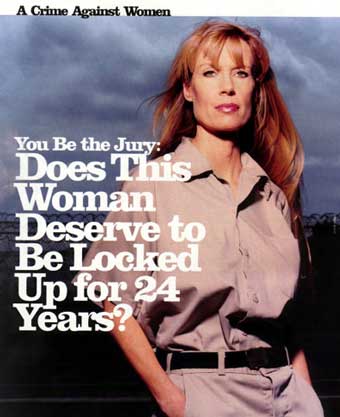
Legalization is sweeping the country (and the world), but so many prisoners of the drug war remain incarcerated. People serving life without parole for a nonviolent offense, like Michael Pelletier (featured here), and Craig Cesal, a first-time offender whose involvement was limited to repairing trucks that had been used in smuggling operations. Both of these individuals were prosecuted under conspiracy laws originally intended to bring down so-called kingpins, but which are now commonly used against low-level offenders (and in fact anyone that has the misfortune to be in close proximity to a drug deal or a drug dealer).
CAN-DO Clemency was founded by Amy Povah, who lived this nightmare herself. Her husband had asked her to handle some “financial matters” for him while he was dealing with legal issues subsequent to his arrest for drug trafficking. At her trial, there was no evidence she’d sold drugs or been directly involved with the dealers. Her ex-husband eventually served four years in prison. For conspiracy, Amy was sentenced to 24. Under mandatory sentencing laws enacted at the height of the drug panic, the only way defendants can earn a reduced sentence is to give “substantial assistance” in the prosecution of other drug dealers; thus those with the least involvement can find themselves facing the most time, as they lack the knowledge or connections to be of use in other prosecutions. Her husband served 4 years in Germany, and was supposed to be extradited to face charges here, but US authorities declined to prosecute based on assistance he had given them. He then returned to the country a free man, and started a successful legitimate business, all while Amy still languished behind bars.
CAN-DO Clemency focuses on:
- non-violent offenders ensnared by the conspiracy law due to their association with someone involved in the drug trade, with an emphasis on women who were incarcerated due to the actions of a spouse or boyfriend.
- anyone serving a long sentence for cannabis with special emphasis on those with a life sentence, and
- individuals who were severely punished because they chose to go to trial rather than plea bargain.
They identify individuals who meet these and other qualifying criteria who are seeking executive clemency as the only means of reducing their unduly harsh sentences, and provide advocacy and suppport. They are currently corresponding with over 400 inmates, one on one, to stay informed and be responsive to their concerns and respond quickly to problems.
They have had considerable success in their mission: there are around 100 individuals listed on their “now free” page, including the most recent clemency recipient, Alice Marie Johnson. Johnson was pardoned by President Trump after Kim Kardashian presented her case to him. The administration subsequently asked for a list of others in a similar situation, and CAN-DO provided a list of 17 women and 6 men. As Amy has said, “Women are far likelier than men to be serving long sentences because of the drugs a spouse or partner sold, due to broad application of the conspiracy law but the converse is not true. Few men, if any, ended up with 20 years to life based on illicit activity attributed to a wife or girlfriend.” The flurry of pardons former President Obama signed before leaving office were overwhelmingly men — out of 1,715 commutations, only 105 women received clemency.
Want to get involved? CAN-DO has a “Guardian Angel” program, which pairs good Samaritans with those who desperately need someone to be their voice, eyes and ears on social media, outreach, and to keep them informed with regard to new laws, criminal justice reform efforts, and rapid responders when something goes wrong in the life of an incarcerated individual. For those unable to make that kind of commitment, CAN-DO is a 501(c) 3 nonprofit foundation and accepts tax-deductible donations.

